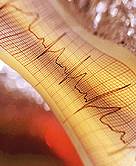
FRIDAY, June 1 (HealthDay News) — Women with a heart rhythm disorder called atrial fibrillation are slightly more likely to suffer a stroke than men with the condition, according to a new study.
The finding suggests that doctors need to consider patients’ sex when making decisions about treatment, the researchers said. Atrial fibrillation raises the risk of blood clots and stroke, and people with the condition are sometimes prescribed anti-clotting drugs.
“In borderline situations, in which a decision about whether to give anticoagulation treatment weighs in the balance, we suggest that female sex should probably tip the scale towards initiating treatment,” the researchers from Karolinska Institute in Sweden and University of Birmingham in England wrote in the report published online May 31 in BMJ.
The study included more than 100,000 atrial fibrillation patients in Sweden who were followed for an average of 1.2 years. During that time, the annual stroke rates were 6.2 percent for women and 4.2 percent for men.
Even after adjusting for a number of factors, the researchers found that women had an 18 percent higher risk of stroke than men. However, the absolute risks were low for both sexes.
For example, the annual rate of stroke was 1.9 percent for women aged 65 to 74, and was lower in men.
Yet not all groups of women with atrial fibrillation were at higher risk of stroke than men, the investigators found. Women younger than 65 without any other risk factors apart from atrial fibrillation did not have a higher stroke risk than men.
These women are at low risk for stroke and do not need anti-clotting treatment, the researchers added.
The authors of an accompanying editorial agreed.
“The registry data confirm overall that women are at higher risk of stroke than men, but when differences in age and risk factor profile are taken into account the excess risk is low,” Eva Prescott of University Hospital, Bispebjerg, in Denmark, and a colleague wrote in the editorial. “More importantly, the absolute risk in younger women with no other risk factors is low and does not merit treatment with oral anticoagulants.”
More information
The U.S. National Heart, Lung, and Blood Institute has more about atrial fibrillation.

